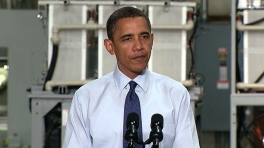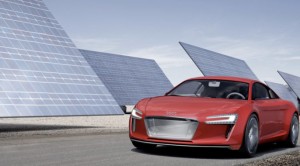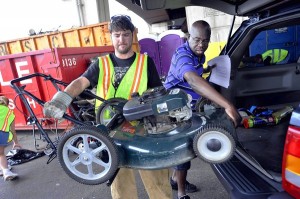Remarks by President Obama on Clean Energy Manufacturing
From ZBB Corporation Manufacturing Facility Menomonee Falls, Wisconsin
Listen to President Obama
I’ve got a couple of people I want to acknowledge. First of all, your wonderful Governor and First Lady, Jim and Jessica Doyle are here. Please give them a big round of applause. (Applause.) We’ve got somebody who is fighting on behalf of Wisconsin families each and every day — Russ Feingold, your wonderful U.S. senator. (Applause.) A great friend and somebody who has been really doing great work over her first couple of years in Congress — Congresswoman Gwen Moore. Please give her a big round of applause. (Applause.)
And thank you, Eric, for the wonderful tour that you provided to us. Please give Eric Apfelbach a big round of applause — CEO of ZBB. (Applause.)
It is great to be here. I just had a chance to see some of the batteries that you’re manufacturing and talk to a few of the men and women who are building them. And the reason I’m here today is because at this plant you’re doing more than just making high-tech batteries. You’re pointing the country towards a brighter economic future.
Now, that’s not easy. We’ve been through a terrible recession -– the worst that we’ve seen since the Great Depression. And this recession was the culmination of a decade that fell like a sledgehammer on middle-class families. For the better part of 10 years, people were seeing stagnant incomes and sluggish growth and skyrocketing health care costs and skyrocketing tuition bills, and people were feeling less secure economically. Read More
U.S. Mayors Continue Press Toward A Green Economy

California Mayors Share Best Practices On Energy Efficiency
The U.S. Conference of Mayors (USCM), the official nonpartisan organization of cities with populations of 30,000 or more, hosted a one-day meeting in San Francisco at the Fairmont Hotel to discuss how cities in California are using federal stimulus dollars to make local communities more energy efficient and to create green jobs.
Long Beach Mayor Bob Foster, who serves in the Conference’s leadership and chaired the session, was joined by host San Francisco Mayor Gavin Newsom, Cathy Zoi, The U.S. Department of Energy Assistant Secretary for Energy Efficiency and Renewable Energy, and several mayors from the state of California to discuss how Energy Efficiency Block Grants are being used for the first time to support local green projects.
First funded under last year’s Economic Recovery Plan and administered by the U.S. Department of Energy, the Energy Efficiency and Conservation Block Grant (EECBG) program is a newly-created program conceived by the Conference of Mayors designed to assist mayors in reducing city energy use and climate emissions. The program allocates $2.8 billion directly to cities and counties to improve energy efficiency and spur economic growth in the green sector, providing direct formula funding to 215 cities and 13 counties in California.
At a press availability held during the meeting, Mayor Newsom described how he is using San Francisco’s block grant funding. “The EECBG program is allowing us to improve energy efficiency in almost 150 buildings serving San Francisco’s diverse neighborhoods,” said Mayor Newsom. “More importantly, these energy efficiency projects create and sustain green jobs, save people money on their utility bills, and cut the City’s carbon emissions by more than 3,000 tons a year.”
The U.S. Conference of Mayors began pushing for the energy block grant in 2005 in conjunction with the introduction of a Mayors’ Climate Protection Agreement — a landmark pledge for mayors across the country to take bold action to reduce carbon emissions in cities by 2012. Now, more then 1,044 U.S. mayors – representing more than 87 million people – are signed onto the Climate Protection Agreement and are committed to making local economies energy efficient.
Since the Block Grant is a key priority for USCM, the organization will also take its message to Congress this fall with a push to continue the program as means of green job creation in cities and metro areas where jobs are needed most.
“Mayors know that green jobs and the new green economy are the future of America’s economic competitiveness,” said Long Beach Mayor Bob Foster, USCM Trustee and immediate past chair of the USCM Environment Committee. “This is why the Energy Block Grant program is at the top of our Mayors’ 2010 Metro Agenda for America, our MainStreet investment plan that focuses on putting people back to work and creating an economy that will lead the world for decades to come.”
Of the benefits associated with EECBG program, Tom Cochran, USCM CEO and Executive Director said, “Mayors understand that a successful plan in this country for reducing U.S. energy consumption is grounded in local action, in our cities, counties and regions. California mayors have been leaders on energy issues in this country, and in particular this program, with strong support of House Speaker Nancy Pelosi and others in the California delegation.”
“We know that extending the Energy Block Grant beyond the Stimulus Bill will help mayors to build upon successes already in progress and meet the climate protection goals as stated in the U.S. Conference of Mayors Climate Protection Agreement with signatories of 1044 USA mayors,” Cochran concluded.
Greta Eagan of FashionmeGreen
An interview with Greta Eagan of FashionmeGreen
Hundreds swap their gas mowers for battery-powered ones
Richard Morgan tried and failed to trade his 2000 Toyota in the federal government’s “cash for clunkers” program, but on Saturday he got a deal from the state of Maryland that was almost as good.
He dumped his gas-hog Honda power mower and replaced it with a brand-new, deeply discounted, battery-powered rig.
“Mowing your lawn is like driving from here to Pittsburgh,” said the 51-year-old Columbia resident, citing a comparison that underscores the environmental damage caused by small gasoline engines.
Morgan and hundreds of other eco-spirited, economy-minded Marylanders jumped at the chance to take part in the Great Maryland Lawn Mower Exchange of 2010. Staged in a parking lot between Baltimore’s downtown sports stadiums, the event was designed to spread the word that gas mowers pollute and to provide an economical way for some to make the switch to battery power. The Maryland Department of the Environment co-sponsored the event with Clean Air Partners, a nonprofit coalition of area governments. Morgan, a cancer scientist at the National Institutes of Health, drove up in a Sienna minivan judged too fuel-efficient to qualify for the clunkers program, which was designed to improve air quality and stimulate the economy by replacing older vehicles with newer, more fuel-efficient ones.
“We’ve been trying to go green in general,” he said, “and it was almost time for a new mower anyway.” Mowers with gasoline engines are unusually dirty machines, spewing harmful compounds into the atmosphere at a prodigious rate. According to the U.S. Environmental Protection Agency, gas mowers produce 5 percent of all air pollution in the United States. Most grass-cutting takes place in the warmest months of the year, when air quality is often at its worst in places like the Mid-Atlantic region
Randy Mosier, head of the MDE’s air-quality division, said he was impressed that some of the mowers that people were trading in had been purchased within the last two years and still looked new. “They’re doing it for the environmental reason, not just for the discount, which is impressing us,” he said as workers tossed the gas-powered castoffs into bright-orange, industrial-sized storage bins from Baltimore Scrap Corp., which plans to shred and recycle the metal components.
The downtown Baltimore event was a promotional coup for Vermont-based Neuton Mowers in the traditional backyard of a much larger competitor, Black & Decker, which also markets a rechargeable mower. In addition to cutting emissions, battery-powered motors also reduce noise pollution. When the blade of the Neuton “smart mower” is spinning, it sounds about as loud as a small vacuum cleaner.
Mosier said the state has run three previous gas-mower trade-in promotions, starting in 1995, but this weekend’s was the most successful by far. More than 900 people, responding to an ad campaign on TV and online, signed up in advance to qualify for the discount. A total of 1,110 new lime-green colored Neuton mowers were available for purchase at roughly one-third the regular price of $400 and $500. If people have to use gas-powered mowers, he said, the best time is “rather early in the morning,” before the atmosphere heats up and ozone pollution worsens.
Alternative Energy: Will U.S. Lead or Follow?
Oil Spill Turns American Minds to Renewable Power Sources As
Inventors, Investors Wait for Gov’t to Get Serious
See the video
WHAT’S INSIDE
SUBSCRIBE TO UPDATES HERE
NEW! ECO TRAVEL
NEW: ORGANIC
NEW! WIND & WAVES
N THE MIX
 TV
TV
VISIT THE SOLAR WALL
QUESTPOINT GOES MOBILE – Beta








